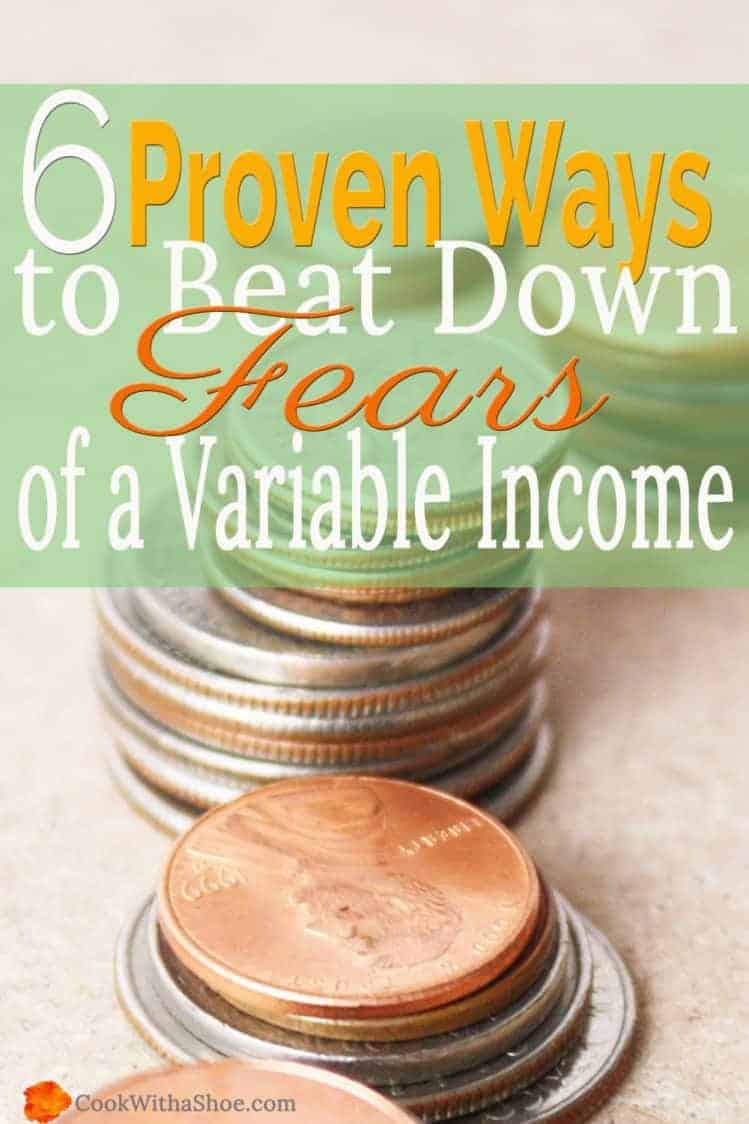Save time and money with my best-selling resources in Complete Change Your Finances Bundle.
Reader's Question: How do you budget on a variable income when you don't know how much money is coming in?
A variable income does take a little more thought and planning when the amount you receive each pay day varies as does when you receive the money.
My entire career as a sign language interpreter, I have had to deal with a variable income. Work is cyclical and there are months when I am turning down work, but others when it can be difficult to get the needed hours.
Needless to say, a variable income can be very stressful.
Manage your irregular income with confidence Know how much money is coming in and how to budget effectively. Stabilize the income dips. Know how much to save and pay off debt. Get the Irregular Income 101 class here This class has been responsible for helping women finally figure out how to handle their irregular income in just a couple of hours!
You wonder about how you will make it during the lean months and if you will get paid in time to pay the rent or buy groceries, praying that no emergencies happen. Then there are months, where you receive such a huge surplus of income you feel like you live in luxury.
So how do you budget a variable income to provide both peace of mind and cover all your basic necessities, while still trying to reach your money goals?
Regardless of if you are self-employed, or just work in cyclical field, there are some great tips to minimize the stress of a variable income.
All these tips are ones I have learned from over a decade of living on a variable income and still practice in my daily life.
Use a budget
Following a budget is absolutely critical to thriving on a variable income and to make sure you can pay for all your regular expenses.
If you have been on a variable income for a while, look at the last year (or as much data as you have if less) and see what the lowest month of income was.
Base your budget on the lowest month of income. All your regular, basic essential bills should be covered with the lowest month of income. My preferred way to budget is using the Zero-Based Budget.
Add a little tweak to the Zero-Based budget, by prioritizing your expenses down the page. A good way to do that would be Food, Lights and Water, Housing, and Transportation at the top of the page, followed by Other essential bills, Non-essential bills, Debt repayment and Savings.
This way, no matter what happens, you will always have enough money for the most basic of necessities.
Lowest Monthly Income
Food
Lights and Water
Housing
Transportation
Other essential bills
$2,200
$350
$130
$800
$250
$550
Total spent $2,080
Manage your irregular income with confidence Know how much money is coming in and how to budget effectively. Stabilize the income dips. Know how much to save and pay off debt. Get the Irregular Income 101 class here This class has been responsible for helping women finally figure out how to handle their irregular income in just a couple of hours!
For example, your lowest month is $2,200. On your prioritized expense budget, you can easily afford Food, Lights and Water, Housing, Transportation, and other essential bills, but there isn’t much money left over.
So on the lowest months, those five line items are all you are able to pay.
Then, the next month brings in $2,800. Great! You will go down the same list, still covering line items 1-5, but now you can cover non-essential bills and even have extra money to throw at the debt repayment (or savings-whichever stage you are in).
Save for lean months
The third month brings in $5,000. Again, go down the list paying for the necessities first. With your extra money, you will want to put either a dollar amount or a percentage or the remaining money into a separate savings account, to help balance out the slow months.
I named mine Summer Savings, since summer is my slow period, but you can be creative and call it a Valley account or a Lean month fund or what other name you would like.
Your Summer Savings account is not an emergency fund. It is not a vacation fund either. It is simply there to help you balance out your variable income, making it easier to budget your money.
How much do you put into your Summer Savings?
It always varied based on how much extra I was able to put aside in the months of plenty. Ideally, I would like to get to the point of having at least 1 month worth of expenses, but haven’t been able to do that yet. However, even having a $1,000 extra helped immensely.
You can always look at the difference between a Normal month, where you can pay for all your bills without paying extra towards your money goals, and a Lean month, where you can only pay the basic essentials. If you can, try to have at least double the difference on hand for savings.
When you do have a lean month and need to dip into this Summer Savings, it is perfectly fine to do that. You shouldn’t feel guilty, because that is the purpose for those dollars. When you are past the lean months, do your best to replenish the fund in preparation for the next time.
Save for annual bills
Adding annual bills as a line item into your budget helps a lot with a variable income. Portion out your annual bills so you have a smaller amount each month instead of coming up with large payment at once.
Put this money into savings so you have all the money when the bill comes due. I have had many times where I haven’t saved for annual bills along the way, and the bill comes due right in the middle of my slow period. Talk about stressful to try and scramble up the money in a month when everything is tight already!
Manage your irregular income with confidence Know how much money is coming in and how to budget effectively. Stabilize the income dips. Know how much to save and pay off debt. Get the Irregular Income 101 class here This class has been responsible for helping women finally figure out how to handle their irregular income in just a couple of hours!
Keep your expenses low
The lower you can trim, and keep, your basic expenses, the easier it will be to ride the waves of a variable income. Make it a game to see how low you can get your regular bills to go.
And track your savings, so you know that it was worth your effort to cut costs.
Not sure you can cut your expenses any lower? Here are some ideas you can try.
Increase your income
One huge positive benefit to being self-employed with a variable income, is you can always hustle to bring in more income. I have picked up a lot more jobs/clients in various seasons when I needed to increase my income. It is a lot of work and extra time, but working more definitely helps.
I have found it is best to diversify your income streams, so you always have income coming in, even if you are not getting work from one particular source.
In my field, I continue to add more agencies I contract with to get work and I have also acquired customers directly. For you, maybe you could add a new service/product or seek out new customers/contracts. Think outside the box and be willing to do work your competitors won’t do, if making money is a priority.
You can also do a side hustle or pick up a second job for those slow times.
Pay off debt
The great relief I experienced the summer after we had paid off all our debts, even though summer was slow, made me realize just how stressful it was to have debt and a variable income.
Yes, I am an advocate of paying off your debt as quickly as you possibly can, but even so when you are relying on a variable income. You don’t need that extra stress in your life when you are managing and adjusting for different amounts of income each month.
Once you have some money in your ‘Summer Fund’, start putting as much as you can towards paying off your debts. The more debt you can get rid of, the less the variable income will worry you.
Make a plan to get rid of all debt, pay one debt off at a time, and track your progress along the way.
Manage your irregular income with confidence Know how much money is coming in and how to budget effectively. Stabilize the income dips. Know how much to save and pay off debt. Get the Irregular Income 101 class here This class has been responsible for helping women finally figure out how to handle their irregular income in just a couple of hours!
These are all very practical steps to dealing with a variable income and have greatly helped me over the years manage my variable income.
In my next post, I will address the emotional aspects of a variable income and how to survive emotionally which is needed as well.
Like this post? Check out all the rest in :
- Setting Up A Budget Series

Hi! I’m Charissa. I’m on a mission to help hardworking women overcome money struggles and gain financial peace with a Biblical perspective so they can have the freedom to impact their families and communities. Ready to make some changes that will impact your finances in 2020? Click here to get a free worksheet to help you make it happen!








